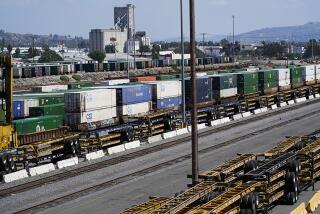Big Firms’ Pension Deficits Continue
- Share via
More than 1,000 big U.S. companies -- including some of the Southland’s largest employers -- continue to suffer severe pension shortfalls despite an improved investment climate.
They reported a combined $278.6 billion in pension deficits in 2003, down from a $305.9-billion deficit in 2002, the Pension Benefit Guaranty Corp. said Thursday.
All companies with pension obligations that exceed their assets by at least $50 million must report their deficits by April 15 each year to the PBGC, a federally chartered agency that covers pension payments when corporations can’t fulfill their promises.
A total of 1,050 companies reported 2003 shortfalls, eight fewer than in the previous year.
The improvements appeared slight considering Wall Street’s banner year. Most pension funds invest heavily in stocks, and the Standard & Poor’s 500 index of blue-chip companies rose 26.4% in 2003.
Howard Silverblatt, pension analyst at Standard & Poor’s Corp., said the showing could partly be explained by low interest rates. Government rules force pension plans to set aside more money when rates are lower to help ensure against shortfalls. And he said funds were still recovering from losses in the bear market of 2000-02.
Some sectors fared worse than others. The PBGC said nearly 13% of the total shortfall was accounted for by just 18 airline and steel company plans, which were short a collective $37 billion in the assets needed to pay workers.
The agency is barred by federal law from revealing the names of companies with shortfalls. However, a review of corporate filings with the Securities and Exchange Commission by The Times indicated that some of Southern California’s biggest employers had significant pension deficits.
UAL Corp., the parent company of United Airlines, has $6.16 billion more in liabilities than it has in assets, the company said in a recent filing. That’s a modest improvement over the $6.38-billion pension shortfall that UAL reported in 2002.
The Chicago-based company, which employs some 6,000 Southern California workers, is reorganizing under Chapter 11 of the U.S. Bankruptcy Code. In late 2003, UAL asked for waivers to give it more time to fund its pension plan, saying that without more time, the company’s reorganization would be compromised. A law passed this year, however, provided that funding relief without the need for waivers, giving UAL more breathing room.
“We plan to meet our pension obligation, we were just seeking for the payments to be smoothed out, which is what the pension bill provided,” company spokeswoman Jean Medina said.
Fort Worth-based AMR Corp., the parent of American Airlines with nearly 6,000 Southland workers, remains $2.66 billion short of the cash needed to fund future retiree obligations, filings show. But the company has made significant progress from 2002, when it posted a $3.43-billion shortfall.
“We meet all the minimum federal guidelines for funding and we have made steady contributions,” company spokesman Al Becker said. “We are satisfied with the progress.”
Among other major Southland employers:
* Chicago-based Boeing Corp., with 35,000 Southland employees, reported a $6.7-billion pension shortfall at the end of 2003, compared with a $7.14-billion shortfall in 2002.
* Lockheed Martin Corp., a Bethesda, Md.-based defense contractor with 9,000 Southern California workers, narrowed its pension gap to $3.45 billion from $4.26 billion.
* Century City-based Northrop Grumman Corp., which employs about 24,000 Southern Californians, reported a $887-million pension shortfall -- a dramatic improvement from the $2.99-billion shortfall the company reported in 2002.
Northrop pumped roughly $140 million into its pension in 2003 and will put $345 million into the plan this year, said company spokesman Frank Moore.
Silverblatt of S&P; said pension funding has remained an issue of concern to shareholders, since these obligations can be a drag on earnings.
“The overall pension numbers have improved, but we are nowhere near out of the woods,” Silverblatt said. “Most of these companies have the cash to make good on their promises, but it may be a bit painful.”
More to Read
Inside the business of entertainment
The Wide Shot brings you news, analysis and insights on everything from streaming wars to production — and what it all means for the future.
You may occasionally receive promotional content from the Los Angeles Times.










